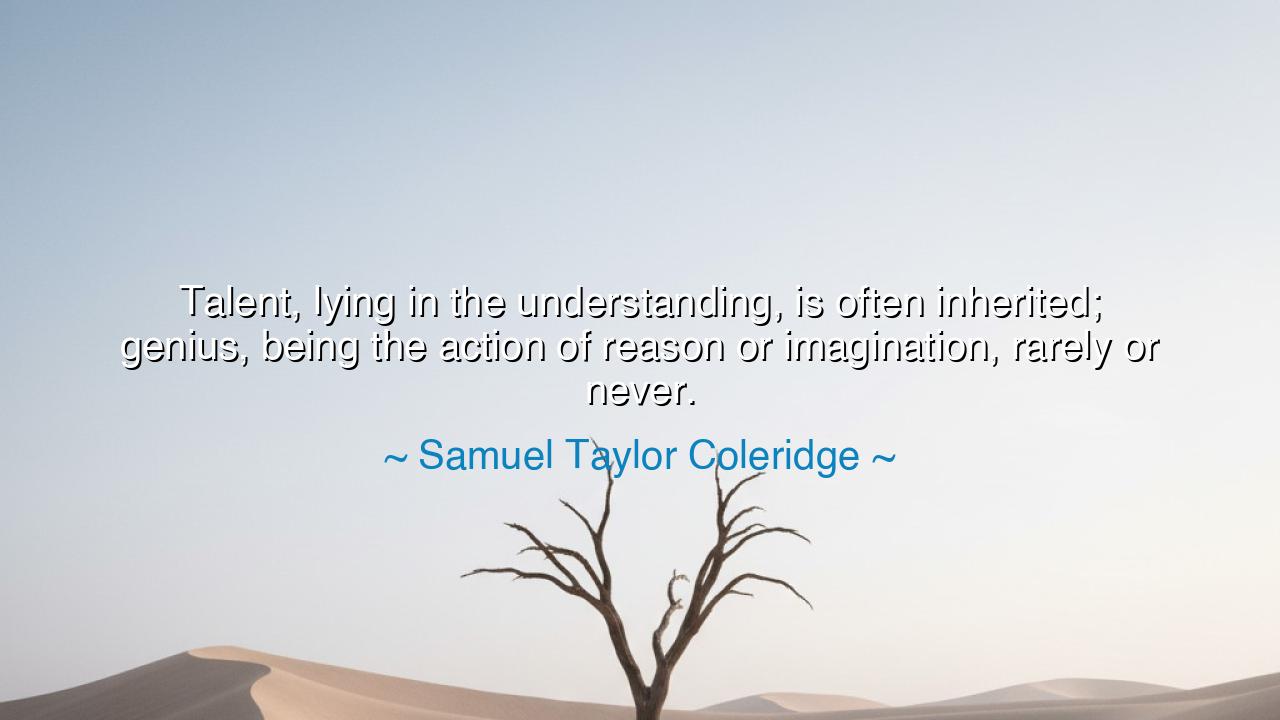
Talent, lying in the understanding, is often inherited; genius
Talent, lying in the understanding, is often inherited; genius, being the action of reason or imagination, rarely or never.






The words of Samuel Taylor Coleridge — “Talent, lying in the understanding, is often inherited; genius, being the action of reason or imagination, rarely or never.” — descend to us like a whisper from the temple of thought. In these few lines, Coleridge, the poet-philosopher of the Romantic age, draws a boundary between what is given by birth and what is awakened by spirit. Talent, he tells us, is a thing of intellect — a spark of the mind that can be passed down through generations like a family heirloom. But genius — ah, genius! — that divine flame of imagination and reason working in harmony, cannot be inherited. It must be born anew in each age, a visitation of the eternal upon the mortal soul.
In the old days, the wise understood this mystery well. The Greeks spoke of the daimon, a guiding spirit that whispered inspiration to poets and philosophers. The Romans called it the genius, the divine breath within a man that moved him to greatness. Coleridge, steeped in their wisdom, reminds us that such fire cannot be taught, nor passed from father to son. Talent may learn the craft, but genius hears the music of the cosmos. One repeats what has been; the other creates what never was.
Think of Wolfgang Amadeus Mozart, that child of celestial harmony. His father, Leopold, was a talented musician — a man of skill, understanding, and diligence. Yet it was Mozart, the son, who touched the infinite. From his hand poured melodies that seemed to descend from heaven itself. Leopold’s talent gave his son instruction; but Mozart’s genius transformed that knowledge into immortal song. Thus we see Coleridge’s truth: understanding may be shared, but imagination is solitary — a visitation from realms unseen.
So too in the realm of words. Many have talent enough to write — to weave sentences pleasing to the ear or arguments strong to the mind. Yet only the rare genius, like Shakespeare, Milton, or Coleridge himself, can breathe soul into words until they stand as living things. Talent arranges; genius animates. Talent polishes the stone; genius makes it glow from within. And so, while talent may be born of lineage and nurture, genius is born of divine unrest — of a mind that sees beyond the visible and hungers for the eternal.
Coleridge’s age was one of awakening — an era when the imagination was exalted as the highest faculty of man, higher even than reason. For through imagination, humanity partakes in the act of creation itself. To imagine truly is to re-create the world as the divine mind once did — to give form to beauty, to light to darkness, and meaning to chaos. Such genius is not mere cleverness; it is communion with the infinite. And so Coleridge warns us: do not confuse talent with the sacred fire, for one may be common as the wind, but the other is as rare as lightning.
Consider, too, the story of Leonardo da Vinci. He was not only skilled in the arts of painting, science, and engineering; he possessed a genius that refused the boundaries of his time. He saw the world not as it was, but as it could be. His mind leapt centuries ahead, conceiving flying machines, anatomical wonders, and visions of celestial grace. No teacher could have given him such sight. It was the action of imagination — the restless union of wonder and reason — that set him apart. His inheritance was not of blood, but of spirit.
And so, dear listener, let this truth take root within you: talent may be nurtured, but genius must be kindled. It is not a gift to be sought in lineage or fortune, but in the quiet cultivation of the soul. Seek understanding, yes — learn, practice, and refine your craft. But beyond that, listen for the whisper that calls you to see the unseen, to imagine what others cannot. Feed your imagination with wonder, solitude, and courage; for only then may the divine spark awaken.
The ancients would say: talent builds temples, but genius calls down the gods to dwell within them. Therefore, live not content with the skill of the hand or the sharpness of intellect. Aspire to that higher flame — the marriage of reason and imagination — by which the human becomes more than human. For though talent is inherited, genius is earned through reverence, daring, and the ceaseless quest for truth. And when that light ignites within you, it will not merely make you skilled; it will make you timeless.






AAdministratorAdministrator
Welcome, honored guests. Please leave a comment, we will respond soon